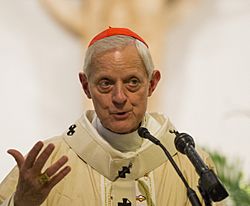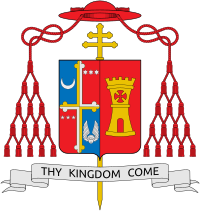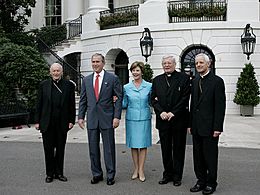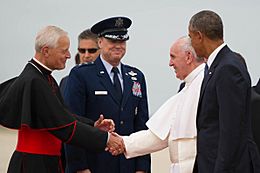Donald Wuerl facts for kids
Quick facts for kids His Eminence Donald William Wuerl |
|
|---|---|
| Cardinal, Archbishop Emeritus of Washington |
|

Wuerl in 2015
|
|
| Archdiocese | Washington |
| Appointed | May 16, 2006 |
| Enthroned | June 22, 2006 |
| Predecessor | Theodore McCarrick |
| Successor | Wilton Daniel Gregory |
| Other posts | Cardinal-Priest of San Pietro in Vincoli Chancellor of the Catholic University of America |
| Orders | |
| Ordination | December 17, 1966 |
| Consecration | January 6, 1986 by John Paul II, Agostino Casaroli, and Bernardin Gantin |
| Created Cardinal | November 20, 2010 |
| Rank | Cardinal-Priest |
| Personal details | |
| Birth name | Donald William Wuerl |
| Born | November 12, 1940 Pittsburgh, Pennsylvania, U.S. |
| Denomination | Catholic Church |
| Previous post |
|
| Motto | Thy kingdom come |
| Styles of Donald William Wuerl |
|
|---|---|
 |
|
| Reference style |
|
| Spoken style | Your Eminence |
| Informal style | Cardinal |
Donald William Wuerl (born November 12, 1940) is an American leader in the American Catholic Church. He was the Archbishop of Washington from 2006 to 2018. Before that, he was the Bishop of Pittsburgh. In 2010, Pope Benedict XVI made him a cardinal, one of the highest positions in the Church.
Wuerl was known for being a moderate leader who could help different groups in the Church find common ground. However, in 2018, questions were raised about how he handled serious problems involving priests under his authority. A report from Pennsylvania criticized his actions when he was the bishop in Pittsburgh. Wuerl has stated that he handled these cases correctly.
There were also questions about whether Wuerl knew about problems with his predecessor in Washington, Cardinal Theodore McCarrick. On October 12, 2018, Pope Francis accepted Wuerl's resignation as Archbishop of Washington. He stayed on to manage the archdiocese until his replacement, Wilton Daniel Gregory, was appointed in 2019.
Contents
Early Life and Schooling
Donald Wuerl was born in Pittsburgh, Pennsylvania, on November 12, 1940. He was one of four children. His father, Francis, worked for the Pennsylvania Railroad and served in the US Navy during World War II. His mother died when he was young, and his father later remarried. From an early age, Donald wanted to be a priest and would even pretend to lead church services for his siblings.
Wuerl went to a parochial school (a school run by a church) in Pittsburgh. After high school, he attended Saint Gregory Seminary in Ohio. A seminary is a college for people studying to become priests. He then went to the Catholic University of America in Washington, D.C., where he earned degrees in philosophy.
Wuerl continued his studies in Rome, Italy. He earned a master's degree in theology from the Pontifical Gregorian University. While he was a student in Rome, he got to watch the meetings of the Second Vatican Council, an important event that updated many practices in the Catholic Church.
First Job as a Priest
Wuerl became a priest on December 17, 1966. His first job was as an assistant pastor at a church in Pittsburgh. He also worked as a secretary for Bishop John Wright.
When Wright became a cardinal in 1969, Wuerl moved to Vatican City to be his full-time secretary. He worked there until the cardinal's death in 1979. While in Rome, Wuerl earned his doctorate degree in theology.
In 1978, Wuerl was present at the papal conclave that elected Pope John Paul II. A conclave is a special meeting where cardinals vote for a new pope. Because Cardinal Wright was in a wheelchair, Wuerl was allowed inside to help him.
Career as a Bishop
Auxiliary Bishop of Seattle
On December 3, 1985, Pope John Paul II appointed Wuerl as an auxiliary bishop of Seattle. An auxiliary bishop helps the main archbishop run the diocese. Wuerl was made a bishop on January 6, 1986, in St. Peter's Basilica in Rome.
In Seattle, a disagreement arose between Wuerl and Archbishop Raymond Hunthausen. The Vatican had given Wuerl the final say on several important matters that the archbishop usually controlled. This created a difficult situation.
In 1987, the Vatican created a special group of bishops to study the problem. After their review, Archbishop Hunthausen's full authority was restored. Wuerl resigned as auxiliary bishop of Seattle, saying the situation had become "unworkable." He and Hunthausen later became friends.
Bishop of Pittsburgh

John Paul II appointed Wuerl as the bishop of Pittsburgh on February 12, 1988. One of his biggest challenges was the financial trouble of the Catholic schools. Many parishes had been built for immigrant families, but over time, there were fewer students and not enough money to keep all the schools open.
To fix the problem, Wuerl had to make tough decisions. In 1994, he closed 37 churches and combined many parishes. This plan, called The Parish Reorganization and Revitalization Project, was later used as a model by other dioceses facing similar issues.
During his time in Pittsburgh, Wuerl also started a television program called The Teaching of Christ. He was known for giving women more leadership roles in the diocese. For example, he appointed the first layperson (someone who is not a priest or nun) to be the superintendent of Catholic schools.
Archbishop of Washington
Pope Benedict XVI named Wuerl the archbishop of Washington on May 16, 2006. As archbishop, he was also the chancellor of The Catholic University of America. In 2008, he hosted Pope Benedict XVI's visit to Washington, D.C.
In 2009, Benedict XVI created a way for groups of Anglicans to join the Catholic Church while keeping some of their traditions. Wuerl was chosen to lead this effort in the United States.
Becoming a Cardinal
On November 20, 2010, Pope Benedict XVI made Wuerl a cardinal. This is a very high honor in the Catholic Church. Cardinals are the pope's closest advisors and can vote in a papal conclave. Wuerl's official church in Rome is San Pietro in Vincoli (Saint Peter in Chains).
As a cardinal, Wuerl was appointed to several important committees in the Vatican, including the Congregation for Bishops, which helps choose new bishops around the world. In 2013, he was one of the cardinal electors who participated in the 2013 papal conclave that elected Pope Francis.
Public Views
Wuerl was seen as a moderate leader who tried to build agreement between different groups in the Church. He was known for being loyal to Pope John Paul II, Pope Benedict XVI, and Pope Francis, even though they had different styles.
Religion and Politics
When politicians hold views that are different from Church teaching, some people believe they should not receive communion. Wuerl said that this decision should be made carefully in each case. He believed the Church's main job is to teach and persuade people, not to refuse communion.
LGBTQ Rights
In 2009, the city council of Washington, D.C., considered a law to allow same-sex marriage. The archdiocese was concerned that the law would force its charities, like adoption agencies, to act against Catholic beliefs. Wuerl stated that the archdiocese wanted to continue its social services but might be restricted by the new law.
After the law passed, Catholic Charities of Washington stopped its foster care and public adoption programs. This was because the law required them to license same-sex couples, which went against Church teaching.
Retirement
Wuerl sent his letter of resignation to Pope Francis in 2015 when he turned 75, the required retirement age for bishops. The pope did not accept it right away. On October 12, 2018, Pope Francis finally accepted Wuerl's resignation. This came after the public learned about how Wuerl had handled problems with priests in the past.
In his letter accepting the resignation, Pope Francis praised Wuerl's service. He asked Wuerl to stay on as the apostolic administrator of Washington until a new archbishop was named. Wuerl's time in that role ended when Archbishop Wilton Gregory was installed in May 2019.
When he retired, Wuerl wrote a letter to the people of the archdiocese. He said, "I am sorry and ask for healing for all of those who were so deeply wounded at the hands of the Church's ministers."
Images for kids
See also
 In Spanish: Donald Wuerl para niños
In Spanish: Donald Wuerl para niños
- Catholic Church hierarchy
- Catholic Church in the United States
- Historical list of the Catholic bishops of the United States
- List of Catholic bishops of the United States
- Lists of patriarchs, archbishops, and bishops
 | Bayard Rustin |
 | Jeannette Carter |
 | Jeremiah A. Brown |



